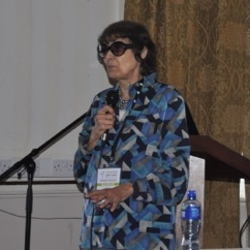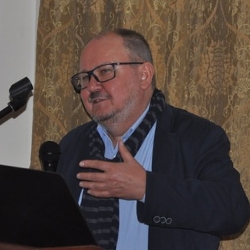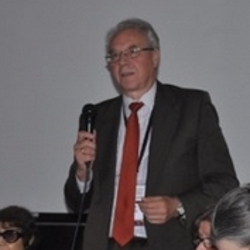IASSW and ICSW Joint Symposium: Social development and social work education-- interaction and synergy
The symposium organized jointly by the International Association of Schools of Social Work and International Council on Social Welfare aimed at discussing the nexus between social-work education and social-development practice. Below are summaries of the discussion at the symposium.
 |
Professor Lena Dominelli
|
Professor Lena Dominelli, School of Applied Social Sciences, Durham University, United Kingdom, began the discussion by urging participants to engage in controversial points about the social protection floor. Although such a floor was, in her view, a good idea in principle, it had many shortcomings in practice. She cited the termination of the SPF experiment in Finland as a good example. It was ended because it was too expensive to fund, and that was in one of the richest countries in the world with a good track record on welfare and the redistribution of resources towards those less well-off. She encouraged people to reconceptualize ideals by drawing upon lived experiences and not to defer idealism when trying to reconcile social-policy design with the lack of resources on the ground for implementation. Even the best-laid schemes, such as Social Protection Floor initiative, can become stuck when faced with resource constraints and the inability of proponents to increase the resource base and budget allocations. Rampant poverty is a huge stumbling block in the formulation of socio-economic policies that have meaningful content and need to succeed in order to improve the lives of the half of the world’s population mired in low incomes. This requires that social protection schemes go well beyond minimum levels so as to empower people in their efforts to acquire a decent quality of life. The effectiveness and efficiency of social protection schemes can be reduced not only by the limited resource base in many countries, but also by the fragmentation of the data collected concerning its success. Becoming innovative and creative by co-producing solutions with service users and practitioners could provide a way forward. But that means that researchers, policymakers and practitioners would have to cede control over development and share policy with others if poverty is to be ended.
 |
Manohar Pawar
|
In order to discuss the significant interaction and synergy between social development and social work, professor Manohar Pawar, Charles Sturt University, Australia, and President of the International Consortium for Social Development (ICSD), presented three important points. First, he emphasized that there is a sound foundation of interaction and synergy between social development and social work, as many social-work educators and practitioners and their professional bodies, including ICSD, have contributed to the knowledge-base for social development. Both social development and social work focus on and work with individuals, families, communities, organizations and institutions at the local, national and global levels, and both focus on well-being and welfare outcomes. Secondly, however, the quality and quantity of the interaction and synergy between them is affected by misconceptions about social development and by our inability to convey what social development is, and it appears that the overcrowded social-work curriculum has little space for any new content, however important, or it is finding it hard to expand the comfort zone of clinical practice.
Thirdly, notwithstanding these issues, new conceptualizations of social development have created great opportunities for strong and meaningful interaction and synergy between the two. Professor Pawar argued that the ideas and ideals of social development are universally applicable; social development is practical and it is possible to practice and achieve social development; social and economic aspects do not compete against each other, as economic development is one of the crucial dimensions of social development; and social development is comprehensive, flexible and evolving. Together social development and social work can flourish.
 |
Timo Voipio
|
A cooperation project aimed at supporting national, regional and international expert initiatives focused on strengthening and systematizing analytical and management capacities in the social-protection area in 11 mainly low-income countries was presented by Dr. Timo Voipio, Director, EU Social Protection Systems Initiative (EU-SPS), THL, National Institute for Health and Welfare, Finland. Taking into account the specific contexts and needs of the host countries, this Initiative brings on board national and regional capacity-development institutions in the assessment and strengthening of national capacities for social protection, making them country-owned and sustainable. The resources that can be tapped to meet the country’s needs vary according to the specifics of the situational context. range of national and regional activities associated with the project and having direct impact on social-work practices was analyzed, e.g. the assessment of organizational capacities and financial options for delivering social assistance; legal assistance regarding social protection; the training of trainers on inclusive policies in various fields; university curriculum development pertinent to social protection; capacity development for local government social workers; the study of shock-responsive social-protection systems, and many others. Building the problem exploration skills of the local participants often required better linkages with the academic community and other experts, both local and international.
 |
Professor Krzysztof Hagemejer
|
Speaking about educational challenges in the areas of social work and social protection, Professor Krzysztof Hagemejer (Poland), ICSW Distinguished Fellow and professor at Bonn-Rhein-Sieg University of Applied Sciences, stressed that synergies between social protection and social work include building strong awareness about social-security policies as major tools available to social workers that are indispensable to the achievement of their professional objectives. Successful implementation of social-security policies (and social-protection floors in particular) requires the full and engaged involvement of professional social workers, not just bureaucrats who identify benefits to be distributed.
Thus, social workers are important stakeholders and should participate in shaping all stages of social-security policy design and implementation.
However, we are facing major challenges that make it difficult to profit from these synergies fully, because there are some pre-requisites that may not always be in place. For example, social-work education and social-security education as academic disciplines, and their respective professions, should to a much greater extent incorporate the body of knowledge of the other discipline into research, academic curricula and professional skills. Moreover, both disciplines are interdisciplinary and thus require a broad interdisciplinary approach (ranging from law and sociology to labor economics, public finance, demography and actuarial mathematics). In this context, there is an urgent need to create awareness of both disciplines and their synergies among stakeholders, policy-makers, opinion-makers and the general public.
 |
Professor Antoinette Lombard
|
Referring to the interaction between social-work education and social-development practice, Professor Antoinette Lombard, Head of the Department of Social Work and Criminology, University of Pretoria, South Africa, indicated that this interaction is embedded in the socio-economic and political realities of society. By adopting a developmental approach, social workers commit to a human-rights-based framework, where both psycho-social services on a micro level and advocacy and policy practice on a macro level are important. In developmental work, social protection is a human right. However, social workers have an ethical responsibility to make sure that people who are already behind do not stay behind by maintaining a survival mode. Promoting well-being starts with people, with respect for their dignity and ensuring that their voices are heard. In the context of sustainable developmental, social protection must be complemented with socio-economic development programs that take the environment into account. Students should be placed in progressive organizations where they can gain experience in challenging social injustice and do advocacy work that will promote social change.
 |
Gabriele Koehler
|
Gabriele Koehler (Germany), ICSW Distinguished Fellow, UNRISD senior research associate, addressed the issue on the agenda relating to whether social protection is a new social norm, taking as a point of departure the world migration crisis.
As we are well aware, 68 million persons are currently forcibly displaced,1 and there are an estimated 260 million international migrants.2 At the US-Mexican and the Southern European borders, the human rights of refugees and migrants are being flagrantly violated on a massive scale.3
The connection of these tragedies to the themes of the Dublin Conference is direct: “… refugees would not risk their lives on a journey so dangerous if they could thrive where they are” (Fleming 2017).4 The notion of “thriving” is essentially about decent work and income, access to social care, education and health services, and about social protection. But: a quick look at social-protection coverage statistics shows that some of the home regions of refugees and migrants feature extremely low social-protection coverage: in Sub-Saharan Africa – 13%, Asia and the Pacific - 39%, Northern Africa - 40%.5 This is one of several factors driving forced displacement and distress migration.
Three international normative frameworks could serve to advance the ability of such people to thrive – the UN’s 2030 Agenda for Sustainable Development,6 which has several goals directly addressing decent work and social protection; and two new Compacts – the Global Compact on Refugees (2018)7 and the Global Compact on Safe, Orderly and Regular Migration (2018).8 It is hoped that the social-welfare and social-work communities will be able to use these frameworks as policy anchors to stop the violation of basic human rights, and promote the thriving of all.
The panelists addressed questions raised by the audience, as well as some cross-current themes highlighted in the presentations.
 |
Professor Sergei Zelenev
|
The discussion was moderated by Professor Sergei Zelenev, Executive Director, ICSW.
1 UNHCR. 2017 Global Trends. http://www.unhcr.org/globaltrends2017/
2UN DESA. 2017 International Migration Report. http://www.un.org/en/development/desa/population/migration/publications/migrationreport/docs/MigrationReport2017_Highlights.pdf
3US immigration policy systematically separates children, including breastfeeding infants, from their families. 1400 persons attempting to reach Europe have drowned in the Mediterranean since January 2018; many are children.
4https://en.tiny.ted.com/talks/melissa_fleming_a_boat_carrying_500_refugees_sunk_at_sea_the_story_of_two_survivors
5Share of total population covered by at least one social protection benefit. Source ILO World Social Protection Report 2017–19. http://www.ilo.org/wcmsp5/groups/public/---dgreports/---dcomm/---publ/documents/publication/wcms_604882.pdf. P. 9
6UN General Assembly. Transforming our world: the 2030 Agenda for Sustainable Development. https://sustainabledevelopment.un.org/post2015/transformingourworld
7http://www.unhcr.org/events/conferences/5b1579427/official-version-draft-3-global-compact-refugees-4-june-2018.html
8https://refugeesmigrants.un.org/sites/default/files/180711_final_draft_0.pdf

